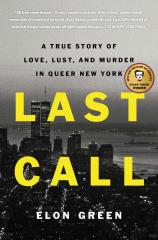Last Call: A True Story of Love, Lust, and Murder in Queer New York
Review
Last Call: A True Story of Love, Lust, and Murder in Queer New York
In the early 1990s, as the queer community of New York City was grappling with the AIDS epidemic and the changing landscape of the city itself, a killer stalked places that were considered safe havens. Eventually convicted of two murders, but suspected of several others reaching back years, Richard Rogers is the elusive serial killer who had a devastating impact on so many. While LAST CALL is about Rogers’ crimes, the heart of the book belongs to the victims, as Elon Green takes special care to maintain their humanity and dignity in this true-crime outing.
The piano bars in New York, while welcoming to all with an ear for great songs, were distinctly queer spaces. The Townhouse Bar and the Five Oaks were comfortable establishments where customers felt like family and sexuality was not judged. Thomas Mulcahy was a quiet, well-respected husband and father who had worked for the same company for years. His wife knew that he was gay while no one else did, so she realized why he had been at the Townhouse on the last night of his life in 1992. One of the last people to see him alive recalled that he left with someone who was a stranger yet was still familiar to him. Unfortunately, this man turned out to be Richard Rogers, who was convicted of Mulcahy’s murder in 2006.
"Green’s writing is sensitive and powerful, and the tale he tells is compelling and tragic.... Overall, this is a fascinating addition to the genre, written with a literary style and uncommon tenderness."
Rogers also was convicted of the murder of 44-year-old Anthony Marrero, a known sex worker. While Marrero didn’t enjoy the same comforts that Mulcahy did, he was remembered by his brother for more than his addiction: a handsome man who had dreamt of being a professional baseball player. Green tells the stories of Michael Sakara and Peter Anderson as well; their murders were incredibly similar to those of Mulcahy and Marrero, though Rogers was never convicted of those crimes.
As these men disappeared and their bodies were eventually discovered, the connection to places like the Townhouse Bar were quickly noted. The patrons grew to fear the Last Call Killer at a time when the LGBTQ+ community was already reeling from the HIV/AIDS epidemic, and many were still not out to coworkers, friends and family members.
Rogers, a registered nurse, used his medical knowledge to kill and dismember or disarticulate his victims. While Green doesn’t shy away from the details of how Mulcahy and others died or how their remains were found, there is nothing sensational here. LAST CALL, though covering a series of terrifying and grisly murders, is written with a more humane tone, and the victims’ lives and relationships are highlighted over their terrible final moments. Readers come to know Mulcahy, Marrero, Sakara and Anderson, along with the investigators who sought justice for them, long before Green introduces them to Rogers.
Green’s writing is sensitive and powerful, and the tale he tells is compelling and tragic. The victims deserve to be remembered for who they were and not just how they died, and Green takes care to see that this is done. Though these particular crimes happened over 25 years ago, gay people in the US remain vulnerable to violence. LAST CALL explores specific murders yet provides a broad view of why homophobia continues to be a real and persistent threat. Overall, this is a fascinating addition to the genre, written with a literary style and uncommon tenderness.
Reviewed by Sarah Rachel Egelman on April 2, 2021
Last Call: A True Story of Love, Lust, and Murder in Queer New York
- Publication Date: June 7, 2022
- Genres: Nonfiction, True Crime
- Paperback: 288 pages
- Publisher: Celadon Books
- ISBN-10: 1250833027
- ISBN-13: 9781250833020




